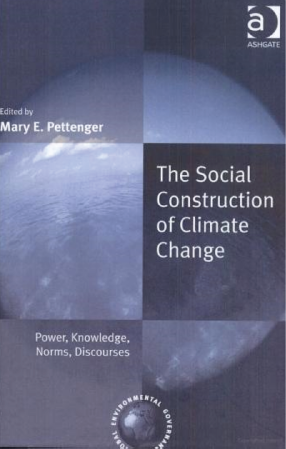Hello
I agree to support this proposal.
Dr Mary Pettenger
Associate Professor
Western Oregon University
Another echo is to be found in 1995 in the controversy over economic dimensions in chapter 6 in the IPCC's second assessment report (SAR). The chapter was originally drafted as a comprehensive overview of climate change damages. Pearce's model (Pearce et al 1996) included differential values for lives in North and South to calculate global cost/benefit analysis of emissions abatement. CJ:ESIN ( 1995) reports that early drafts of the chapter led to contentious debates at official presentations as well as on the ecological economics mailing list which included a formal protest endorsed by hundreds of scientists and researchers. The chapter was rejected at a meeting in Geneva and the key elements of the rewritten chapter were not included in the summary for policymakers (a key part of IPCC's assessment reports). Well-articulated objections to the chapter were raised by Masood (1995) and by Meyer (1995) and his Global Commons Institute, who out of this developed the notion of "contraction and convergence" (C&C). The C&C framework models how the trajectory of emissions would travel if we start from a status quo emissions distribution and move towards per capita equality (convergence) while reducing emissions to an overall level which is a politically set goal to achieve climate stability (contraction). It is interesting to note the range of actors who have expressed support for C&C They are able to do this precisely because the framework articulates concerns of the South for equal per capita emissions with US/Western concerns for "meaningful commitments" from developing countries.
In some sense, the "equal per capita" position poses a challenge to territoriality in that it relates individuals (as humans) to the atmosphere as a global common. It establishes individuals' equal access and responsibilities according to universal principles. However, those individual CO2 contributions are actually calculated on the basis of national emissions and then divided by the number of people living in the state. Thus, in fact it is a territorially based "per capita position" that takes the emissions of the national community and divides by the population. Hence, the low Indian per capita level depends on the large amount of poor Indians with very low emissions, while the Indian middle class consumes carbon at or close to an OECD (Organisation for Economic Co-operation and Development) average. Thus the debates around justice, while being instinctively cosmopolitan and working in ethical terms alongside the scientific constructions of climate change as "global," in fact get drawn back to a statist account of rights. In the climate negotiations, the principle of "sovereign equality" is underpinning the agreed protocols for emission reductions. This is clearly reflected in the Kyoto Protocol where all Annex I panics agreed to reduce emissions by al least 5% from 1990 levels by 2008- 2012. 1990 was decided upon as the "base year" and a "cap" was put on past emissions. Thus in the dominant version, it is Americans (or other DECO states' members) that have in effect an a priori "right" to emit CO2 at the rate they do, and any collectively agreed proposals to limit emissions need to start from that rate of emission as the point of departure. In the contex.t of the climate negotiations, allocations based on past emissions is tellingly named "grandfathering." It is the grandfathers of a political community, who through past actions, have acquired a "status quo right" for the now living to continue to use the atmosphere in the way they want. This reflects the (now palpably patriarchal) master discourse of territorial sovereignty in two ways. First, the members of the political community in question are territorially defined and, second, they are justified in the claim that the community should accept any intervention in the way they choose to live their lives. The consequence of "equal per capita emissions," when the idea is put into concrete proposals, at least proposed by state negotiators, is that the scheme becomes mediated by the Southern state's right to negotiate on behalf of "its" people through the principle of non-intervention which means that the Indian state can conceivably argue for equal per capita emissions in international politics while rejecting a right of the international community to question the distribution of emissions within India.
The Social Construction of Climate Change: Power Knowledge Norms Discourses
edited by Mary E. Pettenger
C&C Campaigns
Why not Follow @aubreygci
Why not
Tweet
this?


